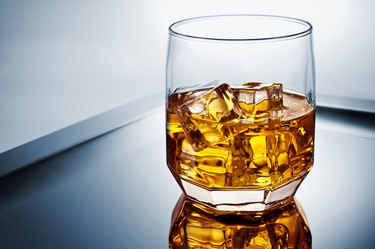
Wake up with a horrible hangover? Alcohol dehydration cures abound, but before you trust old wives' tales or the hair of the dog, read on. Though there's no instant hangover remedy, there are ways to hydrate your body after drinking and ways to prevent that hangover feeling in the first place.
Read more: Can Exercise Really Cure a Hangover?
Video of the Day
Video of the Day
Drink This to Avoid Dehydration
Unless you're a fan of dry mouth, nausea and hangover headaches, you'll likely do anything to avoid alcohol dehydration symptoms.. The easiest way to do this is to stop dehydration before it starts — and, no, that doesn't mean you have to give up happy hour altogether.
But the type of alcohol you choose affects how dehydrated you become. "The darker the beverage or higher the alcohol by volume (ABV) concentration, the more dehydrating it can be," says New York City-based addiction specialist Aaron Sternlicht, LMHC, CASAC.
Beyond going lighter with your liquors and ABV content, Sternlicht recommends preventing dehydration by drinking watered-down drinks, such as:
- Mixed drinks with seltzer.
- Drinks on the rocks.
And you've likely heard this before, but hydrate between drinks and take your time.
"It's important to replenish fluids after drinking, or better yet, while drinking," Sternlicht says. "If you're planning to drink alcohol, you ideally want to hydrate with water between drinks and also space out your drinks. Drinking water between drinks will help reduce the quantity of alcohol you consume, which has benefits beyond hydration."
How to Hydrate After Drinking
Even the best-intentioned drinker can get carried away and wind up with a hangover and alcohol dehydration symptoms, which, per Mayo Clinic, include:
- Headache.
- Muscle aches.
- Dizziness.
- Shakiness.
- Rapid heartbeat.
- Nausea and vomiting.
Reaching for hydrating beverages is the best way to alleviate a hangover's unpleasant effects — but not every liquid fits this bill.
"To rehydrate quickly," says Boston-based registered dietitian Erin Kenney, RD, LDN, you need to "consume electrolyte-fortified water or low-sugar sports drinks, rather than just reaching for plain water. Drinking too much plain water can cause you to lose even more electrolytes, slowing down rehydration."
According to Cedars-Sinai, electrolytes are minerals, such as potassium, sodium, chloride and calcium, which keep you hydrated and support important bodily functions — such as muscle contractions and nervous system upkeep.
And to avoid super-sugary sports drinks that are low in the electrolytes your body needs, Taylor Engelke RDN, CD, of Nutrimental Healthcare in Oshkosh, Wisconsin, says the "replacement of electrolytes with sugar-free sports drinks or Pedialyte can help replace fluids, as well as electrolytes you've lost. You can also freeze these in an ice cube tray and add to water after drinking to get rehydrated before bed."
Another option, Kenney says, is "you can also obtain natural electrolytes by consuming foods that contain magnesium, potassium, sodium, chloride and calcium. Try a smoothie with banana, Greek yogurt, coconut water or a handful of spinach."
"What you shouldn't do during a hangover," Engelke says, "is drink any more alcohol."
Why Alcohol Dehydrates You
Whether you've had just one — or one too many — alcohol acts as a diuretic (translation: it makes you pee a lot — hence, you lose fluids).
"Alcohol inhibits the release of vasopressin, or ADH, the antidiuretic hormone," says San Diego-based Taylor Graber, MD, a resident anesthesiologist at the University of California San Diego. "ADH helps your kidneys hold onto water. The less ADH, the more you urinate. The more you urinate, the more dehydrated you become."
According to the Society for Endocrinology, ADH is produced and released by the pituitary gland. It's the reason why you can usually sleep through the night without having to urinate. And when ADH release is suppressed, your body's natural mechanism for holding onto fluid ceases to function. This is important because increased urination flushes electrolytes and nutrients out of your system, as well as fluid.
The takeaway: Hangovers are no fun. Hydrating during and after imbibing can help you keep the party going while reducing the not-so-fun side effects.
- Cedars-Sinai: “What Are Electrolytes?”
- Taylor Graber, MD, resident physician, anesthesiology, University of California San Diego; owner, mobile IV hydration treatment for hangover recovery: ASAP IVs, San Diego
- Erin Kenney, MS, RD, LDN, HCP, registered dietitian, licensed nutritionist, Boston
- Taylor Engelke, MS, RDN, CD, CMHIMP, registered dietitian nutritionist, Nutrimental Healthcare, Oshkosh, Wisconsin
- Mayo Clinic: “Hangovers: Symptoms & Causes”
- Aaron Sternlicht, LMHC, CASAC, licensed mental health counselor, certified alcohol and substance abuse counselor, Family Addiction Specialist, New York City
- Society for Endocrinology: “Anti-Diuretic Hormone”
Is this an emergency? If you are experiencing serious medical symptoms, please see the National Library of Medicine’s list of signs you need emergency medical attention or call 911.